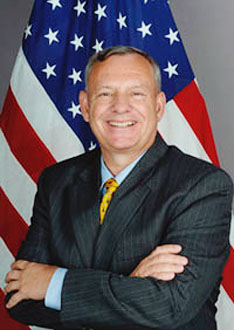Difference between revisions of "Dell Dailey"
m (Text replacement - "|WP=http" to "|wikipedia=http") |
m (tidy references,description) |
||
| Line 4: | Line 4: | ||
|nndb=http://www.nndb.com/people/422/000166921/ | |nndb=http://www.nndb.com/people/422/000166921/ | ||
|constitutes=soldier, spook | |constitutes=soldier, spook | ||
| + | |description=Former [[US Coordinator for Counterterrorism]]. | ||
|employment={{job | |employment={{job | ||
|title=US Coordinator for Counterterrorism | |title=US Coordinator for Counterterrorism | ||
|start=June 22, 2007 | |start=June 22, 2007 | ||
|end=April 2009 | |end=April 2009 | ||
| − | |||
}} | }} | ||
}} | }} | ||
| Line 14: | Line 14: | ||
==Career== | ==Career== | ||
| − | After the [[9-11 attacks]], Dailey he directed the new [[Center for Special Operations]], the military hub for all "[[counterterrorism]]" - [[U.S. Special Operations Command]], at MacDill Air Force Base, Florida as well as running special operations in [[Afghanistan]] and [[Iraq]].<ref name=Wright20070824> | + | After the [[9-11 attacks]], Dailey he directed the new [[Center for Special Operations]], the military hub for all "[[counterterrorism]]" - [[U.S. Special Operations Command]], at MacDill Air Force Base, Florida as well as running special operations in [[Afghanistan]] and [[Iraq]].<ref name=Wright20070824>http://www.washingtonpost.com/wp-dyn/content/article/2007/08/23/AR2007082302031.html</ref> From 2001 to 2003, he headed the [[Joint Special Operations Command]], a [[United States Special Operations Command]] sub-unit responsible for the US military's tier-one special operations units such [[Delta Force]], [[Naval Special Warfare Development Group]] and the [[Intelligence Support Activity]].<ref name=Wright20070824/> Dailey was both praised and criticized for his leadership during the invasion of Afghanistan in 2001. Although his planning helped the US effectively insert its Special Operations units into the country, Dailey faced criticism for not deploying more troops in the unsuccessful hunt to capture [[Osama bin Laden]].<ref name=allgov>http://www.allgov.com/Official/Dailey__Del</ref> |
| − | |||
| − | |||
| − | |||
| − | |||
| − | |||
| − | |||
| − | |||
| − | |||
| − | |||
| − | |||
| − | |||
| − | |||
| − | |||
| − | |||
{{SMWDocs}} | {{SMWDocs}} | ||
==References== | ==References== | ||
{{reflist}} | {{reflist}} | ||
Latest revision as of 03:45, 6 August 2021
(soldier, spook) | |
|---|---|
 | |
Former US Coordinator for Counterterrorism.
|
Dell Dailey is a former US Coordinator for Counterterrorism.
Career
After the 9-11 attacks, Dailey he directed the new Center for Special Operations, the military hub for all "counterterrorism" - U.S. Special Operations Command, at MacDill Air Force Base, Florida as well as running special operations in Afghanistan and Iraq.[1] From 2001 to 2003, he headed the Joint Special Operations Command, a United States Special Operations Command sub-unit responsible for the US military's tier-one special operations units such Delta Force, Naval Special Warfare Development Group and the Intelligence Support Activity.[1] Dailey was both praised and criticized for his leadership during the invasion of Afghanistan in 2001. Although his planning helped the US effectively insert its Special Operations units into the country, Dailey faced criticism for not deploying more troops in the unsuccessful hunt to capture Osama bin Laden.[2]